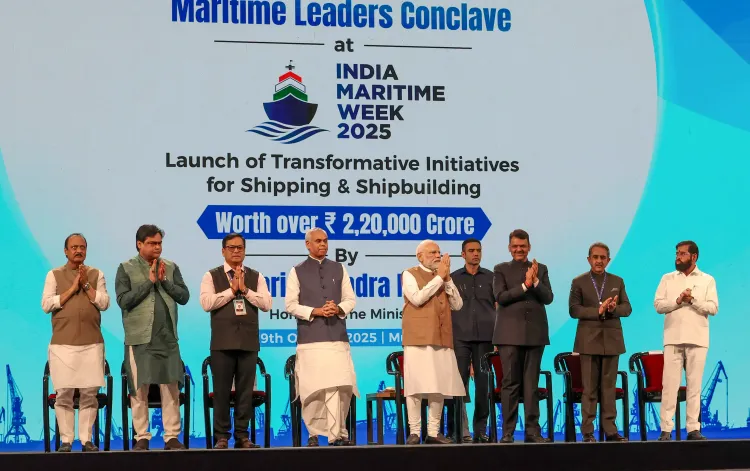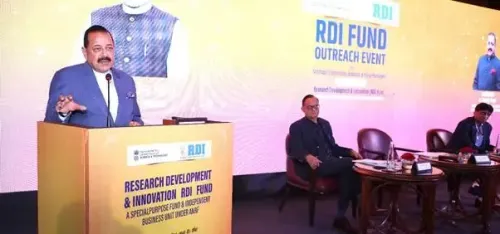Is India the Ideal Destination for Maritime Investments?

Synopsis
Key Takeaways
- India's maritime sector is expanding rapidly.
- Significant investments are being made in port infrastructure.
- Focus on sustainability and innovation is paramount.
- New legislative measures are modernizing maritime governance.
- Global investors are invited to join India's growth story.
New Delhi, Oct 30 (NationPress) Prime Minister Narendra Modi highlighted that India is the ideal destination for investments in the maritime sector during his remarks on the nation's rise as a premier locale for maritime investments."With an extensive coastline, world-class ports, and a robust infrastructure, we invite you to invest in India," PM Modi stated.
In an elaborate LinkedIn post, the Prime Minister discussed how India's strategic positioning, advanced port facilities, and dedication to innovation are unveiling vast opportunities for investors in areas such as shipbuilding, port operations, logistics, coastal shipping, and related services.
He pointed out that with over 7,500 km of coastline and a growing network of globally competitive ports, India is on track to become a significant maritime hub, providing not only connectivity but also value-added services, green shipping initiatives, and favorable policy frameworks.
The Prime Minister urged both domestic and international investors to “come, invest in India” and engage in the country’s maritime growth narrative, which is supported by strong infrastructure, clear intentions, and developing innovation ecosystems.
“India's shipping capabilities are expanding across coasts and rivers. The number of Indian-flagged vessels rose from 1,205 to 1,549, with fleet gross tonnage increasing from 10 MGT to 13.52 MGT. Coastal shipping cargo nearly doubled from 87 to 165 MMT,” PM Modi noted.
Furthermore, inland waterway cargo surged by 710%, from 18 MMT in 2014 to 146 MMT in 2025. Operational waterways expanded from 3 to 32, while ferry and Ro-Pax services served 7.5 crore passengers in 2024-25.
“Our vision for the Maritime sector prioritizes sustainability and innovation. Vizhinjam Port has emerged as India's first deep-water transshipment hub, while Kandla Port hosts the nation’s inaugural green hydrogen facility. JNPT has doubled its capacity and made history with the largest FDI in port development,” said PM Modi.
The Vadhvan Port project in Palghar, Maharashtra, involving an investment of approximately Rs 76,000 crore, will be among the few deep-draft ports globally at 20 meters. Its seamless railway and highway connectivity, along with its closeness to the Delhi–Mumbai Expressway and the Western Freight Corridor, will revolutionize the region's economic landscape, opening new avenues for logistics, warehousing, and trade.
“Five significant bills, including the Bills of Lading Bill and the Indian Ports Bill (2025), have reformed maritime governance, simplified trade processes, empowered states, and aligned India with global standards. To expedite this growth, the government has sanctioned a Rs 70,000 crore umbrella package for the maritime sector,” PM Modi remarked.
His comments followed the 'India Maritime Week 2025' conference in Mumbai, where he discussed India's advancements in the maritime field and recent legislative reforms.
“When global waters are turbulent, the world seeks a reliable beacon. India is poised to fulfill that role. In times of global strife, trade disruptions, and shifting supply chains, India stands as a bastion of strategic autonomy, peace, and inclusive growth,” he asserted at the event attended by delegates from over 85 nations.
During the occasion, PM Modi unveiled initiatives worth Rs 2.2 lakh crore for shipping and shipbuilding, which encompasses the acquisition of 437 vessels. Numerous MoUs covering sectors like port-led industrialization, port development, sustainability, and shipbuilding were signed during India Maritime Week, aiming to bolster shipping as a foundational infrastructure.










